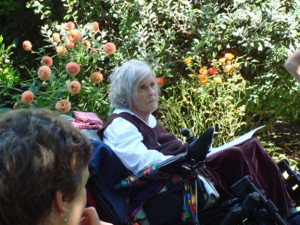Posts Tagged ‘multiple sclerosis’
Going Dark
In 1966, my friend Diana Neutze developed multiple sclerosis (MS). She was not yet thirty years old.
I first met Diana about ten years before this, when we shared English Lit. classes as freshmen at Canterbury University in Christchurch, New Zealand. During school breaks we worked as kitchen hands at the same remote fishing camp. I was part of her wedding, and she of mine. We lived next-door to each other as young marrieds, and shared survival tips as penniless expatriate mothers of small children in London. Even after I moved to California and she returned to New Zealand, we stayed in touch as best we could.
For decades Diana’s illness came and went. She learned to live with it, devising ingenious stratagems for making sure she stayed mobile and independent. Whenever possible, she refused medications. All she had left, she said, was her mind, and her ability to find joy in music and the beauty of her garden. Painkillers took that clarity of mind from her, and this she could not allow. Right up until the end she was writing and publishing poetry. (I reviewed a recent book in these pages) I introduced her, via email, to a quadriplegic friend who got her started with voice recognition software. When she could no longer edit using one finger on a keyboard, or see to read, she dictated edits to a carer.
Diana and I traded poems and, as her body slowly but inexorably closed down, thoughts about death. She was in my mind when Gallery Bookshop in Mendocino invited local poets to respond to Wendell Berry’s poem “Going Dark” at a 2012 Winter Solstice event. I sent the poem to Diana, and included it in my new chapbook, Earthward. When I spoke to Diana via Skype in April 2013, three days before she died, she accepted my promise to dedicate Earthward, to her memory. At her request, my poem, “Going Dark,” was read at her funeral. Here it is:
Going Dark
To go in the dark with a light is to know the light.
To know the dark, go dark. Go without sight,
and find that the dark, too, blooms and sings,
and is traveled by dark feet and dark wings.
— Wendell Berry
My friend’s body is a brown leaf,
shriveled and curled inward.
Pain is a constant, yet
the fierce flame of her will
refuses surrender.
It’s not death’s darkness she resists
but the loss of a self transfixed
by what is beautiful:
a Bach air, the light
through her walnut tree.
This dark she speaks of
has no scent of earth,
no draft from unseen wings,
no sudden rustle in the undergrowth.
What can I say to her, and to myself,
this season of gathering in
our lives against the rainy dark,
against the ancient fear
that light will not return?
Just this: a dry leaf
fallen to ground disintegrates,
becomes the food that nourishes
all that sweetly blooms and sings.
My chapbook Earthward is available from Finishing Line Press. The direct link is: https://finishinglinepress.com/product_info.php?cPath=4&products_id=2129
Some of Diana Neutze’s poems can be read on her blog site, Living With Multiple Sclerosis.
Words and Music from an Inner Garden
For more than forty years, my friend Diana Neutze has endured the relentless thefts of multiple sclerosis and grief for a son lost too young. Throughout that time, she has continued to write powerful and moving poems. Recently, her body closing down, she commissioned the New Zealand composer Anthony Ritchie to set some of her poems to music. The cycle of seven songs, “Thoughts from an Inner Garden” premiered April 2011 in a performance at Diana’s house in Christchurch, New Zealand. Diana recently sent me a CD of that performance. I’ve been playing it over and over, overwhelmed by the beauty and intensity of the work.
From Diana Neutze’s published collections, A ROUTINE DAY and UNWINDING THE LABYRINTH, Ritchie selected poems that express the poignancy of the poet’s sense of connection with the tangled garden that surrounds her house, a garden that has become her world. Transcending the nightmare of her chronic illness, she finds meaning in the details of the natural world: the play of light and shadow, the song of a bird.
The cycle opens in a minor key, an ancient, timeless sound that describes a day of wet greyness without wind when the garden is holding its breath. In “Bridal,” the second song, the poet, showered by autumn gold, imagines the roses and smoke bush as witnesses to a marriage between herself and the garden. The mood changes in “Chronic,” where Ritchie’s urgent rhythm reflects the tick-tocking of illness/ relentlessly. “And the Birds Sing” is a meditation on the cycles of life and death. “A Scent of Water” offers a fragile hope in the face of grief: a frosting of growth/ a shivering of buds in the morning light. The rhythms of an old folk dance come to mind in “Meaning.” A moment in late afternoon, a blackbird singing in a weeping elm, and the day is flooded with meaning. The cycle closes with “Goodbye.” The poet recalls the garden images she will die loving. The theme of a Bach partita enters the music as she describes its architectural splendour … arch after musical arch soaring upwards.
